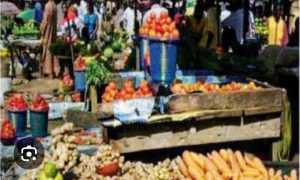

By Dada Ahmed.

As Nigerians continue to grapple with the accelerated high inflationary trend in recent history, economic analysts such as Amos Samuel believe that the conversation about economic survival in , Nigeria is no longer theoretical, insisting that it is real. From the bustling markets of Lagos to the quiet streets of Lokoja, one thing unites millions of Nigerians: the high cost of living. In the same vein,prices of food, transport fares, housing, and basic services have reached unbearable heights, pushing more citizens below the poverty line daily.
At the heart of this crisis lies the removal of fuel subsidy in 2023, a policy decision by the Federal Government meant to reduce financial waste and boost infrastructural development. While some members of the political class beat chest that the removal of fuel subsidy succeeded in eliminating an age-long burden on government finances, experience shows that the development has inadvertently triggered a wave of social and economic hardships. The immediate effect was a spike in the cost of fuel, which in turn affected the cost of transportation, food, and virtually all sectors of the economy.
However, by the beginning of 2025 or there about, international oil prices dropped, and the cost of petrol in Nigeria followed suit. Surprisingly, this reduction has not translated into lower transport fares or decreased prices of goods and services. The question on everyone’s lips is: why are prices not coming down?
A significant part of the answer lies in the attitude of Nigerian traders, many of whom have been described as “Shylock traders.” Like the infamous Shakespearean character who demanded a pound of flesh as repayment, these traders are known for their cutthroat pricing tactics. They rarely reduce prices, even when supply conditions improve or when the cost of production falls.
In most markets across Nigeria, the price of a bag of rice, beans, yam, onions, pepper, and tomatoes has doubled or tripled in the last two years. Traders claim high transportation costs, insecurity, and exchange rate volatility as reasons. But as the price of petrol begins to show a downward trend, when the exchange rates drop, the same traders refuse to reflect these changes in their pricing thus,
transport fares on the rise.Concerned Nigerians believe that this reflects more than just market dynamics and trace the problem to unchecked greed.
The Nigerian factor, a combination of inefficiency, dishonesty, corruption, and an obsession with quick profit, is another explanation for this abnormality. Many traders believe that once a price goes up, it should never come down. Even artisans and service providers have joined the bandwagon, charging clients based on “current market conditions,” regardless of whether those conditions still apply.
Sadly, there is no legal or institutional mechanism to regulate prices in Nigeria. The country once had a Price Control Board, which monitored the cost of essential commodities. That body was scrapped in the name of liberalization and market freedom. Today, that decision is haunting the nation, as traders operate freely without fear of sanctions or oversight.
There is a growing call among civil society groups, economists, and suffering citizens for the Federal Government to re-establish a Price Control Board or a similar agency. Such a body, if empowered, they expressed optimism that such a board ,if well managed,can effectively monitor the pricing of essential goods, prevent exploitative practices, and set fair price ranges,especially in the food, housing, and transport sectors.
However,some economic analysts argue that a price control board may not work in a liberal economy but others counteract this school of thought, arguing that even free markets need regulations to protect consumers from excessive exploitation.They cite price ceilings and enforcement mechanisms which they note have worked in other developing countries to stabilize economies during crises. According to a financial expert, Abdullahi Mohammed,Nigeria can adopt a hybrid model that ensures fairness without stifling business.
He called on the three tiers of government invest in infrastructure and tackle insecurity, especially on highways to enable farmers access their farms with minimal fear of banditry and kidnapping.
Mohammed’s suggestion cannot be overemphasized because experience shows that when food production drops due to insecurity, prices inevitably rise. That means a secure environment is critical to lowering the cost of living.
In the transport sector, commuters call for urgent government intervention, adding that state and federal authorities must regulate transport fares, especially for public commercial services like buses, tricycles, and taxis. Providing subsidies to transport operators or reinvigorating government-run mass transit schemes can significantly reduce commuting costs, the further urged.
The Central Bank of Nigeria and other financial institutions, some concerned Nigeria also advised,must also play their part by further stabilizing the naira and providing accessible credit to farmers and small-scale manufacturers to boost efficiency and food production.According to them this will improve supply and production, easing inflationary pressure from the supply side.
Public enlightenment is also key. Citizens must learn to demand accountability from sellers and boycott exploitative markets when necessary. Consumer rights advocacy must be strengthened. Market unions should not be allowed to operate like mafia groups, enforcing artificial scarcity and fixing arbitrary prices.
It must be stressed that the persistent high cost of living in Nigeria is no longer just an economic issue. It has become a moral one, a reflection of a society where personal profit often overrides collective wellbeing. While global factors may influence inflation, local greed, and lack of regulation make things worse. It’s time for the government to rise to the occasion and protect the people from the tyranny of shylock traders.
According to Anthony Subaru,a civil servant,only a balanced combination of policy enforcement, infrastructure investment, and ethical reorientation can bring down the soaring prices and restore hope to millions of struggling Nigerians.
Ahmed , a member of the Nigerian Guild of Editors,NGE, publishes The Reporters.
ahmeddada008@gmail.com.


